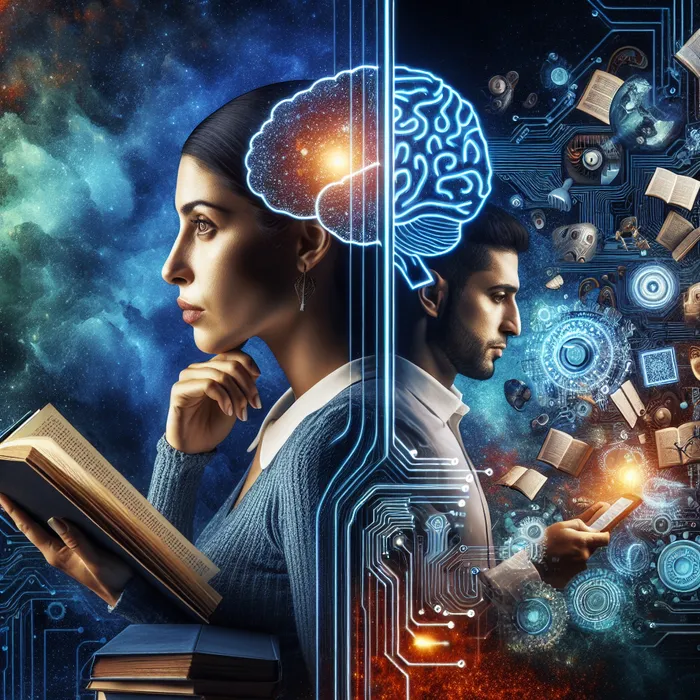How AI tools like ChatGPT may be eroding our critical thinking abilities

The impact of AI on independent thinking
Image: Ron
We’ve all done it: opened ChatGPT for a quick essay draft, work email, or even a birthday toast. It's fast and easy, but are we trading convenience for the ability to think for ourselves?
A recent study from MIT’s Media Lab has sparked debate.
Researchers found that people who relied on ChatGPT for writing tasks showed significantly less brain activity and weaker memory recall than those who worked without it. In other words, when AI does the heavy lifting, our brains may start slacking off.
So, are we heading for what some experts are calling “cognitive debt”, a slow erosion of critical thinking and creativity? Or is this just another moral panic, like when calculators first landed in classrooms?
Key findings of an MIT study
Over four months, the MIT team tracked 54 adults, aged 18–39, as they wrote short essays. Some used ChatGPT, others used Google, while a third group had to rely purely on their own thinking.
Using EEG scans to measure brain activity, researchers discovered that ChatGPT users had the lowest neural engagement and performed the worst in recall tests.
By their third essay, many participants were essentially copy-pasting ChatGPT’s answers. Their essays sounded polished but were described by teachers as “soulless” and lacking original thought.
Meanwhile, the “brain-only” group showed stronger brain connectivity in regions linked to creativity, memory, and problem-solving.
They also reported a higher sense of ownership over their work. The Google group landed somewhere in the middle, showing that searching for information still demanded more active engagement than simply asking an AI.
Dr Nataliya Kosmyna, lead author of the study, didn’t mince words: “Developing brains are at the highest risk. If kids start relying on ChatGPT too early, they may never fully build the skills for independent thinking.”
It’s not just about students and homework. The way we use AI today will shape how our brains adapt tomorrow.
In a piece from "Time", Dr Zishan Khan, a psychiatrist, warns that over-reliance on AI could weaken resilience and memory in young people. “Neural connections that help you access information and retain knowledge may not develop as strongly if the habit of outsourcing thinking begins too early,” he explains.
And this isn’t the only worrying signal. Earlier studies from MIT also found that the more time people spent chatting with AI, the lonelier they reported feeling. Convenience, it seems, can sometimes come at the cost of deeper engagement with our thoughts and with others.

Exploring the implications of AI tools like ChatGPT on our cognitive abilities, as recent MIT research reveals concerning trends in memory recall and independent thinking
Image: Mental Health America (MHA) /Pexels
Haven’t we been here before?
History gives us a useful comparison: the calculator. When it first appeared in classrooms in the 1970s, teachers worried that students would lose the ability to do math. Instead, exams were redesigned to demand more complex reasoning, and calculators became a tool, not a crutch.
The same could happen with AI. Right now, many schools and workplaces haven’t “raised the bar.” Assignments and tasks often stay the same, which makes it too easy to let ChatGPT do the thinking.
Without updated expectations, the temptation to let AI replace critical thinking entirely grows stronger.
Is AI always harmful?
Here’s the nuance. The MIT study is still pre-peer review, meaning it hasn’t gone through the full scientific vetting process yet. Its sample size was small, and some of its results might be due to study design quirks rather than AI itself.
Other research paints a more balanced picture. A Harvard study published in May 2024 found that generative AI made people more productive, though it also left them less motivated. In the workplace, AI has been shown to save time, reduce stress, and even spark creativity when used thoughtfully.
The takeaway? It’s not the tool itself, but how we use it.
So how do we use AI without losing our minds?
Like any shortcut in life, it’s about balance. Here are a few practical ways to make sure ChatGPT complements your thinking rather than replaces it:
- Use it for brainstorming, not final drafts. Let ChatGPT help spark ideas, but always rewrite in your own words.
- Practice “AI fasting.” Try doing some tasks without AI to keep your problem-solving muscles sharp.
- Raise your own bar. If AI makes things easier, challenge yourself to go deeper, ask better questions, and explore more angles.
Related Topics: